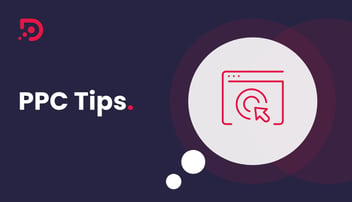In 2021, consumer behaviour is evolving at a pace we've never experienced before. Today's buyer does not want to be sold to; they put more consideration into their purchases, too.
Trust is one of the biggest drivers in consumer behaviour, and it's only getting bigger. Tech brands need to align their marketing strategies with consumer expectations and ensure they are building trust from the very first to the very last interaction.
The way a prospect engages with your brand either builds or breaks trust. The contrast between paid search and organic search can mean the difference between enhanced trust or a wasted click.
Take a look at the research we conducted into the effects on consumer trust using paid search vs organic search and decide for yourself.
If you're in charge of conversion rate optimisation, marketing budgets, or are simply weighing up the pros and cons of each marketing method, this will help you make an informed choice that meets your organisational goals.
Educating consumers on how digital marketing actually works could be the key to boosting conversions, especially in organic search, where consumers sometimes overestimate their understanding of key driving factors.
According to our study of 2,000 regular Internet users, trust in any given digital marketing channel varies according to the user’s comprehension of how that channel works.
For example, users who don’t understand how browser cookies work are less likely to trust retargeted adverts. Conversely, a little knowledge can be a dangerous thing; those with a moderate understanding of search algorithms put too much trust in organic search results.
Surprising Marketing Tech Insights
- “Creepy targeting” - Low comprehension of retargeting can result in users being ‘alarmed’ at the high relevance of an advert
- Trust in paid search channels is lower among users who understand how Google’s algorithm works
- 1 in 4 over-55s showed good comprehension of how digital marketing works in general
- Users with a moderate or good comprehension of the Google algorithm may be too trusting of organic search results
- 1 in 3 believe all websites have paid to appear in Google search results
Comprehension of Natural vs Paid Search
To discern the participant’s level of comprehension of various digital marketing channels, we asked them a set of questions about each channel. We then filtered the responses by comprehension level to see how comprehension influenced trust.
So, if a user believed browser cookies were a type of virus that cybercriminals used, we made the assumption that they wouldn’t understand how retargeted ads worked.
If a user correctly answered that adverts appearing in search engines are based on website owners bidding for that specific keyword, we assumed a moderate level of understanding.
Perhaps unsurprisingly, comprehension, in general, was highest among 18-24-year-olds. 54% displayed high comprehension of how browser cookies worked, for example, selecting the most accurate definition from a list.

Over-55s showed the lowest comprehension in general, but even so, a quarter demonstrated high or moderate comprehension. Higher than we assumed.
Cookie Comprehension
| Correct answer in red: | Average | 18-24 | 25-34 | 35-44 | 45-54 | 55+ |
| Q. What are browser cookies for (please select an option that best matches your opinion) | ||||||
| Browser cookies are a type of virus used by cyber fraudsters | 14% | 5.41% | 9.00% | 8.55% | 19.19% | 26.30% |
| Browser cookies are files used by websites to collect my personal data and may be used to identify me personally | 31% | 29.48% | 38.56% | 36.27% | 26.01% | 24.64% |
| Browser cookies are text files used by websites to track my browsing history and usage habits | 39% | 53.81% | 43.19% | 41.19% | 31.57% | 25.36% |
| I have no idea what browser cookies are used for | 16% | 11.30% | 9.25% | 13.99% | 23.23% | 23.70% |
Influence of Comprehension on Retargeting
**Users are more trusting of retargeted adverts when they understand how they work**
Internet users with a moderate or high comprehension of how cookies work are nearly three times more likely to click on a retargeted advert than those with low or no comprehension.
56% of high comprehension users said they’re comfortable seeing adverts that are based on their browsing behaviour. But only 16% of those with low comprehension said the same.
17% of users with low comprehension said they find it “alarming” to see an advert that is clearly targeting them based on previous browsing behaviour.
Among those who remember seeing adverts that appeared to be based on previous browsing history, half of those in the low comprehension group believed their personally identifiable data had been used. It’s no wonder these users experienced alarms. This goes to support our theory that educating consumers could go some way to improving conversion rates.

Influence of Comprehension on Paid Search
**Paid search appears to benefit from a lack of user comprehension**
Users who displayed the highest level of comprehension were most likely to avoid clicking on search engine results they believed were paid adverts.
10% of the high comprehension group said they habitually scroll down when viewing a search engine results page to access the organic results.
Users with low comprehension were most likely to click on the first result they see without scrolling down the page. This was particularly prevalent among older users who displayed lower comprehension. We didn’t control for the type of query in this part of the study, so take those stats with a small pinch of salt.
Influence of Comprehension on Organic Search
**Organic search marketing benefits from higher levels of comprehension**
Organic search was perhaps the most interesting channel for examining the relationship between comprehension and behaviour.
Those with higher comprehension of how search engine results pages are ranked correctly answered that search engines give prominence to results they deem to be from reputable, authoritative sources and that inbound links to a website positively impact a page’s search engine performance.
However, a little knowledge can be a dangerous thing and a significant number in that cohort are at risk of putting too much trust in the results.
20% of the moderate and high comprehension group believe that the top organic result for a search query is always the best source of information, ignoring the reality that search engines can and often do promote results that are inaccurate or misleading.
In fact, a few days after we completed this study, SE Roundtable revealed that the top organic result for the high-volume search term ‘cure for Cancer’ was a junk science article promoting carrot juice. This highlights that while Google is generally a good source of reliable information, the algorithm can get things wrong.
Another interesting takeaway from the study emerged in the 25-34 age group. Only 10% of that group admitted to having no knowledge of how search engines organised their results.
The lowest of any cohort in any question about digital marketing channels. In fact, of the 90% who believed they understood how Google’s search results worked, only 30% demonstrated high comprehension.
How Can Marketing Tech Help Improve Consumer Trust?
Simon Leeming, Co-founder of Digital Media Stream, believes openness around how digital channels are used for marketing can be a positive thing for consumers:
“As the research suggests, distrust can arise from consumers simply not understanding why they are seeing a certain piece of content. Or worse, thinking they understand what’s going on they don’t. For example, if you have no understanding of the mechanics behind why you’re seeing a certain advert, it can be quite alarming to see a retargeted advert.
“I think as an industry, we have a responsibility to be as open as possible with consumers on how we use their data and how the various marketing channels work. If trust increases as a result, that’s only going to benefit the industry as a whole.”
Inbound Marketing is the modern solution to a modern problem. If you're ready to find out how to enhance consumer trust through transparent marketing, we're ready to help you bring it to life. Book your free consultation today.




